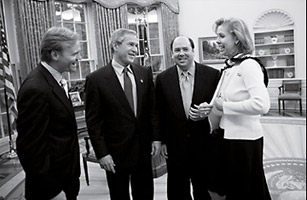
President Bush speaks with Dickerson, left, Cooper and Gibbs in the Oval Office
(2 of 5)
A person who works closely with you said you don't mind being disliked when you make a tough call.
I think the natural instinct for most people in the political world is they want people to like them. On the other hand, I think sometimes I take kind of a delight in who the critics are. Sometimes I look through that teleprompter, when I'm giving the State of the Union address, and see reactions — I'm not going to characterize what the reactions are, but nevertheless, it causes me to kind of want to lean a little more forward into the prompter, if you know what I mean. Maybe it's the mother in me.
Sometimes you're defined by your critics, and on the other hand — my presidency is one that has drawn some fire, whether it be at home or around the world. I truly believe that the decisions I made will make the world a better place. Unfortunately, if you're doing big things, most of the time you're never going to be around to see them, whether it be cultural change or spreading democracy in parts of the world where people just don't believe it can happen. And I understand that. And I'm not — this, by the way, this happens to be an issue that crosses party lines. And I fully understand that. And I probably — if you aim for big change, you shouldn't expect to be rewarded by short-term history. I don't expect many short-term historians to write nice things about me, anyway. And I'm probably not going to see the effects of policy in the long-term. And in order to do some of the — make some of the decisions we have made in this administration, you have to believe. And I went to Bethesda, and I have to look at people in their eye who have been wounded by an IED, and say, "I believe what you're doing is going to make the world a better place." And if you're faking it, the people will read you like a book. And I believe it.
The Afghan election, interestingly enough — admittedly, there's more work to be done. I'm not suggesting you're looking at the final chapter of what has taken place in Afghanistan. But the elections were amazing. And if you go back and look at the history of the prognosis about Afghanistan — whether it be the decision in the first place, the quagmire, of whether or not the people can even vote — it's a remarkable experience. I believe that a free Afghanistan, a democratic Iraq, will affect the Middle East in a positive way. I believe we've got a shot for Middle Eastern peace.
One of the great ironies of life will be that a Palestinian state and Iraq became the catalyst for change in a part of the world that needs change. At least, that's our foreign policy, it needs to change. That's as opposed to managing calm, in the hopes that there won't be another September 11th, or in the hopes that the Salafist [radical Islamic ]movement will somehow wither on the vine, in the hopes that somehow these killers won't get a weapon of mass destruction, the hope that somehow time will change their hatred toward free, loving societies. I don't believe America can afford to sit back and hope that that happens, because I don't think it will. I think quite the contrary. I think trying to manage calm will only empower and embolden these movements beneath the surface.
And you know what? The election was about this, this issue of the use of American influence, in many ways. I can remember people trying to shift the debate. And I wanted the debate to be on a lot of issues, but I also wanted everybody to clearly understand exactly what my thinking was. And you go back and look at the debates and look at all the noise and all the rhetoric, you'll see that the speech in New Jersey or the speech in Colorado were aimed at making it very clear, the stakes in this election when it comes to foreign policy.